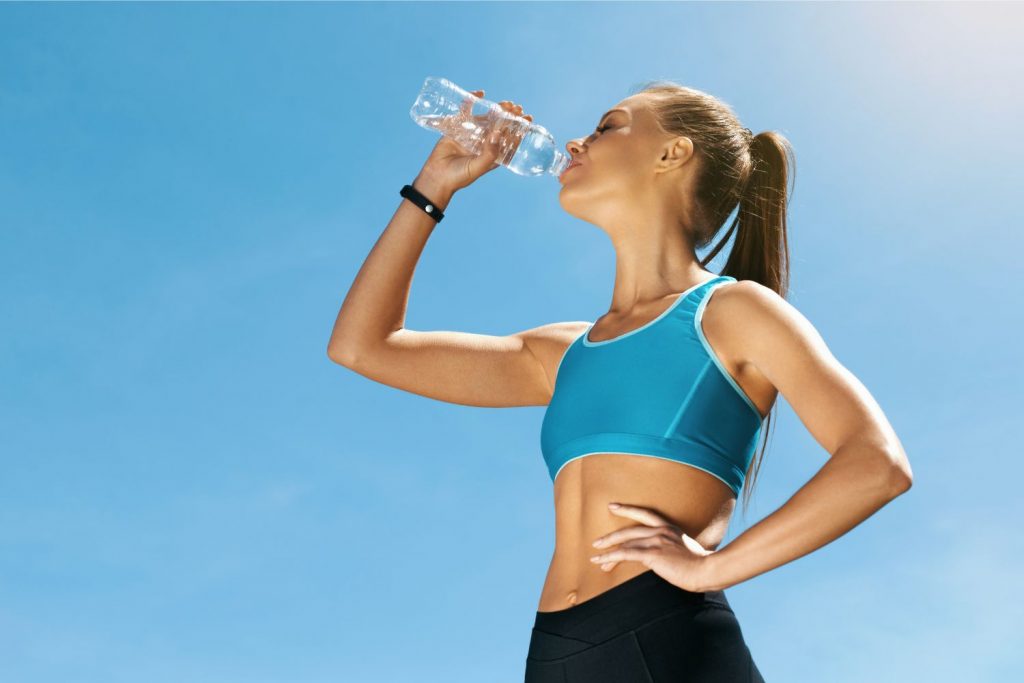![]()
As the days get longer, and we approach summer, it’s crucial to prioritize your eye health. More time outdoors, increased exposure to UV from the sun, and more time spent in the water can affect your short- and long-term eye health. We will discuss five tips for improving your eye health during summer.
Stay hydrated
Drinking water helps keep your eyes hydrated, which is especially important during the summer months when the heat, sun exposure, and elements can lead to increased evaporation of tears.
The wind at the beach and a chlorinated pool are common environmental conditions that cause dry eye. Adequate hydration is key for optimal body performance especially heart and kidney health. It has also been tied to better overall physical and cognitive performance.

An increase in water intake may improve dry skin and is associated with fewer dry mouth symptoms. Doctors often recommend drinking more water to alleviate dry eye symptoms.
Dehydration may be associated with a high salt level in tears, a condition called tear hyperosmolarity. This imbalance in tear film osmolarity is often associated with dry eye disease (DED), where the tears either evaporate too quickly or are not produced in sufficient quantity to keep the eyes adequately lubricated.
While artificial tears can help alleviate the symptoms of dry eye by providing temporary relief from dryness, irritation, and discomfort, they may not directly improve tear film osmolarity. Instead, artificial tears work by adding moisture to the eyes, temporarily increasing tear volume, and enhancing lubrication.
There are some artificial tear formulations specifically designed to address the evaporation component of dry eye, a deficiency in the lipid layer of the tear film. These formulations contain ingredients that help stabilize the tear film and reduce tear evaporation, which could indirectly contribute to improving the tear film. A lipid-based artificial tear should be a permanent part of your pool or beach bag.
Learn more about types of artifical tears here.
UV protection
Protecting your eyes from UV (ultraviolet) rays during the summer is important for the health of your eyes and the prevention of cataracts, macular degeneration, and photokeratitis (sunburn of the cornea).
You should always wear UV protectant sunglasses that block 100% of both UVA and UVB rays. Though polarized lenses do not provide any more UV protection than tinted lenses, they reduce the glare off the water when you go swimming or boating. UV rays can reflect off surfaces like water, sand, and pavement, increasing exposure to your eyes.
Sporty sunglasses with a wraparound frame will provide additional coverage and protection by blocking UV rays from entering your eyes from the sides. Sunglasses should be paired with a wide-brimmed hat for extra protection.
You should also think about your eyelids and the skin around your eyes. Skin cancers like melanoma, basal cell, and squamous cell are common on the eyelid margins.
UV damage to the conjunctiva, the thin, clear membrane over your eye, can result in a pterygium, which can affect your vision and cause your eye look red. Like the front of the eye, UV exposure can result in cancers in the back of the eye.
Children’s eyes are especially vulnerable to UV damage because the lens inside the eye is not developed until 21 years of age. Babies and children should always wear UV-protective sunglasses and hats when outdoors.
Contact lens care
Wearing contact lenses during the summer requires extra care to ensure comfort and maintain eye health, especially in hot and humid weather conditions. More time is spent in pools, lakes, and the ocean during the summer, which can put a contact lens wearer at risk for an eye infection.
If you can, avoid wearing contact lenses while swimming, because water can introduce bacteria and other microorganisms into your eyes. If you do swim with contacts, wear waterproof goggles to protect your eyes and remove your lenses immediately after swimming to reduce the risk of infection.
Daily lenses are ideal for summer because they don’t need to be cleaned or stored, and a new pair is inserted each morning. Daily lenses significantly reduce your chance of infection.
If you aren’t wearing daily lenses, be sure to follow the recommended cleaning and disinfection regimen for your contact lenses to prevent the buildup of debris, protein deposits, and bacteria, which can cause discomfort and eye infections. Use only the contact lens solution recommended by your eye doctor, and avoid using tap water or saliva to clean or store your lenses.
Always replace your contact lenses as directed by your doctor whether they are daily disposable, bi-weekly, or monthly lenses. Using lenses beyond their recommended wear schedule can lead to discomfort, decreased oxygen flow to the cornea, an increased risk of eye infections, permanent scarring, and vision loss.
Balance screen time with outdoor time
Reducing indoor screen time and spending more time outdoors during the summer can benefit both your physical and mental health. Spending time outdoors exposes you to natural light, which helps regulate your circadian rhythm and improves sleep quality leading to better overall well-being and reduced screen-related fatigue.
Outdoor activities encourage physical exercise, which are important for a healthy weight, improved cardiovascular health, and reduced risk of chronic diseases. Sunlight stimulates the production of vitamin D in your skin, which is essential for bone health, immune function, and mood regulation. Some studies show Vitamin D may play a role in preventing our eye prescription from worsening during childhood.
Eat healthy
Eating a healthy diet rich in nutrients is best for overall eye health. These foods can be easily incorporated in your summer meals. Leafy salad greens like spinach, kale, and Swiss chard are packed with lutein and zeaxanthin, which are antioxidants that are beneficial for healthy vision and may reduce the risk of age-related macular degeneration.
Tomatoes, bell peppers, carrots, and sweet potatoes are rich in vitamin C, beta-carotene, and other antioxidants that help protect the eyes from damage caused by free radicals and UV exposure. The vegetables can be grilled during the summer for a healthier option.
Many summer fruits like blueberries, strawberries, and raspberries, are high in anthocyanins, which have anti-inflammatory and antioxidant properties that can benefit eye health.
Protecting and maintaining your eye health during the summer is key to enjoying the season with both visual clarity and eye comfort. By following simple practices like wearing UV-protective sunglasses, staying hydrated, and pursuing a healthier diet, you can minimize the risk of eye strain, dryness, and sun damage.

